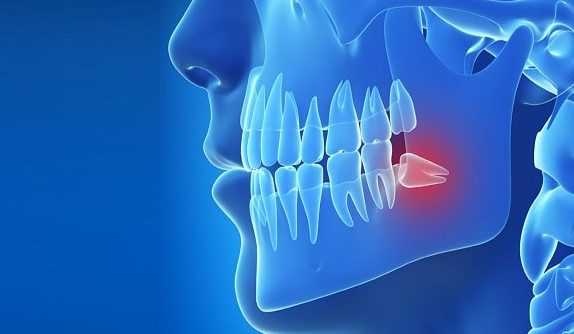Wisdom tooth pain is a common problem experienced by many people, sometimes manifesting itself very intensely. Briefly explaining the cause of this pain: wisdom teeth are generally located in the back of the jaw and are often embedded. As a result, these teeth cannot surface in most people, causing severe pain. So, what helps with wisdom tooth pain? Let's explore this in detail in our article.
Wisdom teeth, often called "20-year molars," get their name because they typically emerge between the ages of 17 and 21. Due to their position in the jaw, these teeth are usually embedded and can exert pressure on the surrounding teeth, leading to the formation of infections. Subsequently, this can result in jaw swelling and severe wisdom tooth pain. So, what helps with wisdom tooth pain?
If you experience intense pain and swelling in your jaw without having cavities in your teeth, it could be due to your wisdom teeth. In such a situation, the sooner you consult a dentist, the faster your problem can be resolved. Let's examine the symptoms and what helps with wisdom tooth pain in more detail.
Wisdom Tooth Pain:

Wisdom teeth are typically found at the farthest back of the mouth and often emerge by leaning against adjacent teeth. Therefore, for many people, wisdom tooth pain can lead to a series of problems such as jaw swelling, severe pain, infections, and disruptions in the alignment of other teeth. Especially, intense toothaches felt in the jaw are indicative of a problematic wisdom tooth. Quick consultation with a dentist is crucial to address these problems.
In some individuals, wisdom teeth remain embedded and do not cause any problems. In such cases, if the wisdom tooth does not harm the alignment and health of other teeth, it is left in place. Dentists use X-rays to determine whether the wisdom tooth should be extracted. Treatment is initiated based on the X-ray results and the position of the tooth.
In some cases, rapid intervention is required due to severe pain and swelling. If the tooth is completely embedded, it is removed through surgery. Rapid treatment is important to prevent the situation from worsening. Before answering the question of what helps with wisdom tooth pain, let's list the symptoms of wisdom tooth to better understand the situation.
Symptoms of Wisdom Tooth:
- Severe, throbbing pain in the ear and jaw
- Inflammation
- Swelling in the jaw and face
- Pressure of the wisdom tooth on other teeth, disrupting their alignment
- Intense pain concentrated in the tooth roots
- Feeling of the wisdom tooth tip on the gums
- Pain and sensitivity while eating
- Headache
These are some of the symptoms of wisdom tooth pain. Even if you don't experience any of these, regular dental check-ups are essential for the health of your teeth. This way, dentists can determine whether wisdom teeth are causing harm to other teeth. Now, before addressing what helps with wisdom tooth pain, let's discuss what to do when these symptoms are experienced and the treatment process.
Home Remedies for Wisdom Tooth Pain:
For those wondering what helps with wisdom tooth pain, we have listed some things that can be done at home. These are solutions that can temporarily alleviate pain and, as with all dental problems, it is crucial to consult a dentist for proper treatment. This way, your dentist can correctly diagnose and plan the treatment.
Let's explore what helps with wisdom tooth pain and what can be done at home step by step:
- Cold Compress Application: You can apply a cold compress to your cheek using an ice pack. This may help alleviate your pain and reduce swelling. If you don't have an ice pack, it is recommended to wrap the ice in a cloth before applying it to your cheek.
- Gargling: Gargling with saltwater, especially in cases of inflammation, may help reduce your pain. Mouthwash solutions can also be used.
- Consuming Liquid Foods: Avoiding chewing on the side with pain and generally consuming liquid foods can prevent the intensification of your pain. Avoiding hard, sugary, and sticky foods is advised. Additionally, it is recommended to refrain from smoking and alcohol during this period.
- Maintaining Dental Hygiene: Regularly brushing your teeth and using dental floss helps protect your teeth, reducing both pain and the progression of the problem.
For those asking what helps with wisdom tooth pain at home, these are the suggestions. However, it should be remembered that these recommendations are only for reducing the intensity of pain at that moment and preventing the situation from worsening. Therefore, for proper diagnosis and resolution of the problem, you can contact us and receive free consultation services from our dentists.
How Long Does Wisdom Tooth Pain Last?
Wisdom tooth pain is a problem that many people complain about. Therefore, there are many questions about this issue. Many people wonder how they can reduce this severe pain at home. One frequently asked question is, how long does wisdom tooth pain last?
Wisdom tooth pain worsens every day until the problematic tooth is extracted. During this process, both the intensity of your pain increases, and the wisdom tooth can also harm other teeth. Therefore, it is recommended to quickly consult a dentist when you notice the symptoms of wisdom tooth. After that, your dentist will start the treatment process.
If you cannot go to the dentist immediately, a few steps taken at home after scheduling your appointment can alleviate your pain. Let's list the steps to help with wisdom tooth pain and what can be done at home.
- First, clean your teeth with dental floss and a soft-bristled brush. Using hard-bristled brushes can harm your teeth and gums. Since the area with pain is extra sensitive, gentle brushing is recommended.
- During this process, try to consume as many liquid and warm foods as possible to prevent the intensification of your pain.
- If you feel swelling in your jaw, applying a cold compress can help reduce both pain and swelling. However, it is recommended not to apply this treatment for an extended period.
- Some pain relievers can also reduce the severity of your pain during this process. However, it is essential to use these pain relievers consciously by consulting your doctor.
When Does Wisdom Tooth Emerge?

If you are wondering when wisdom teeth emerge, these teeth typically come in between the ages of 17 and 24. However, in some individuals, they may remain embedded for a more extended period. The timing varies depending on an individual's dental structure. If you feel a small hardness in your gums at the far back of your teeth, it indicates the arrival of your wisdom teeth.
Wisdom teeth can also make their presence known before fully emerging. Due to their side position, they can exert pressure on the roots of other teeth, eventually causing severe pain. Jaw swelling is also a sign of wisdom teeth. In such cases, it is advisable to quickly consult a dentist.
In some individuals, these teeth may remain embedded or emerge without causing issues. However, they often lead to severe pain. In this article, we focused on what helps with wisdom tooth pain. Now, let's continue our article by discussing the tooth extraction process.
Wisdom Tooth Extraction:

Wisdom tooth extraction is different from the extraction of regular teeth. The treatment may vary depending on the individual, considering whether the tooth is embedded and its position. Your dentist will decide on the treatment process after taking X-rays and conducting necessary examinations. In some cases, antibiotic treatment may be required before the surgery. After regular use of antibiotics, you can proceed with the extraction of your teeth.
After the necessary examinations, the wisdom tooth extraction is performed. The tooth is opened with a cut in the gum, and then the tooth is removed. Subsequently, the incision is stitched up to close it. With regular care after the operation, the patient can recover quickly.
Paying extra attention to dental hygiene accelerates the healing process during this period. Additionally, using pain relievers and medications recommended by your doctor is essential.
Wisdom Tooth Extraction Cost:
The cost of wisdom tooth extraction can vary depending on the progression of the treatment. According to information provided by the Turkish Dental Association (TDB):
- Impacted Tooth Operation with 10% VAT: 79 £
- Bone-Retained Impacted Tooth Operation with 10% VAT: 89 £
Prices are determined in this way and may vary in different private hospitals. If you want to benefit from our free examination service and obtain price information, you can contact us.
After Wisdom Tooth Extraction:
Taking care of your teeth after wisdom tooth extraction accelerates the healing process and ensures that your pain rapidly subsides. This way, you can recover quickly. So, what helps with wisdom tooth pain after extraction, and how should care be done?
- Avoid contact with the area where the tooth was extracted. This can cause bleeding, leading to a prolonged recovery process.
- Avoid eating on the side where the tooth was extracted during the period recommended by the dentist.
- It is advised to minimize spitting during the recovery process.
- You can apply a cold compress if there is swelling.
- Rest as much as possible during the recovery period and avoid strenuous physical activities.
- Use the medications prescribed by your doctor regularly.
- Pay extra attention to oral hygiene.
In our article, we addressed what helps with wisdom tooth pain and how the treatment process progresses. For the most accurate and healthy information, you should consult with a dentist. If you have a wisdom tooth problem, you can take advantage of our free examination service at our clinic and start the treatment process with expert dentists.

 English
English Turkish
Turkish Deutsch
Deutsch العربية
العربية![[:en]What Helps with Wisdom Tooth Pain? Symptoms and Treatment Process[:tr]20’lik Diş Ağrısına Ne İyi Gelir? Tüm Belirtiler ve Tedavi Süreci[:de]Was hilft gegen Weisheitszahnschmerzen? Symptome und Behandlungsverlauf[:ar]ما الذي يساعد في تخفيف ألم ضرس العقل؟ الأعراض وسير العلاج[:] 20'lik diş ağrısına ne iyi gelir](https://proestetik.com.tr/wp-content/uploads/2023/10/20-lik-dis-agrisina-ne-iyi-gelir.png)










